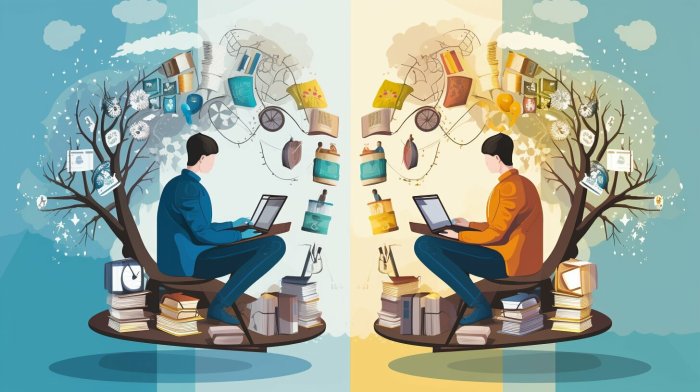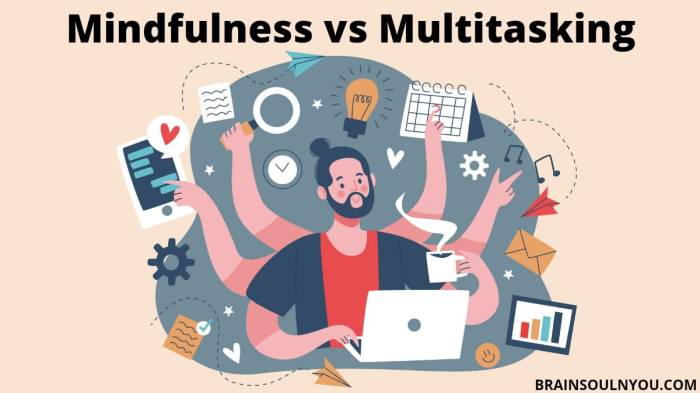In an era characterized by relentless demands and constant distractions, the question of which is better mindfulness or multitasking has emerged as a pivotal topic. This article delves into the intricacies of these two distinct approaches, exploring their benefits, drawbacks, and the contexts in which each is most appropriate.
Mindfulness, a practice rooted in present-moment awareness, has gained widespread recognition for its ability to reduce stress, enhance mental well-being, and improve cognitive performance. On the other hand, multitasking, often perceived as a necessary evil in the fast-paced world, involves juggling multiple tasks simultaneously.
Definition of Mindfulness and Multitasking

Mindfulnessis a mental practice that involves paying attention to the present moment, without judgment. It involves being aware of one’s thoughts, feelings, and bodily sensations, and accepting them without reacting or trying to change them.
Multitasking, on the other hand, refers to the ability to perform multiple tasks simultaneously. It involves dividing one’s attention between different tasks, often with the goal of increasing productivity or efficiency.
Benefits and Drawbacks of Mindfulness and Multitasking
Benefits of Mindfulness
- Reduced stress and anxiety
- Improved emotional regulation
- Enhanced self-awareness
- Increased focus and concentration
- Improved sleep quality
Drawbacks of Mindfulness
- Can be difficult to maintain focus, especially for beginners
- May not be suitable for individuals with certain mental health conditions, such as ADHD
Benefits of Multitasking
- Increased productivity
- Improved efficiency
- Enhanced ability to handle multiple responsibilities
- Can be beneficial in certain situations, such as when working under time constraints
Drawbacks of Multitasking
- Can lead to decreased quality of work
- Increased cognitive load and mental fatigue
- Can impair decision-making
- May lead to increased stress levels
Comparative Analysis of Mindfulness and Multitasking

Effectiveness in Reducing Stress and Improving Mental Well-being
Mindfulness has been shown to be more effective than multitasking in reducing stress and improving mental well-being. Mindfulness practices help individuals to develop greater self-awareness, emotional regulation, and acceptance, which can lead to reduced stress levels and improved mood.
Cognitive Performance and Productivity, Which is better mindfulness or multitasking
While multitasking can lead to increased productivity in certain situations, it is generally less effective than mindfulness for enhancing cognitive performance. Mindfulness helps to improve focus, concentration, and attention, which can lead to better decision-making and problem-solving abilities.
Creativity and Innovation
Mindfulness has been linked to increased creativity and innovation. By fostering a state of open awareness and acceptance, mindfulness allows individuals to generate new ideas and approach problems from different perspectives.
Situations Where Mindfulness or Multitasking is More Appropriate

Mindfulness is preferred when:
- Need to reduce stress and improve mental well-being
- Want to improve focus and concentration
- Engaging in creative or problem-solving tasks
- Need to develop greater self-awareness and emotional regulation
Multitasking is more suitable when:
- Need to complete multiple tasks quickly
- Working under time constraints
- Handling a variety of responsibilities
- Need to maintain situational awareness
Integration of Mindfulness and Multitasking: Which Is Better Mindfulness Or Multitasking

Potential Benefits
- Improved productivity and efficiency
- Reduced stress and cognitive load
- Enhanced decision-making
- Increased creativity and innovation
Challenges
- Can be difficult to integrate mindfulness into multitasking activities
- May require significant practice and effort
Practical Strategies
- Take regular mindfulness breaks throughout the day
- Practice mindfulness while performing routine tasks
- Use mindfulness techniques to transition between tasks
- Set clear boundaries and prioritize tasks
Query Resolution
Which approach is more effective for reducing stress?
Mindfulness has been consistently shown to be more effective than multitasking in reducing stress levels.
Can multitasking improve cognitive performance?
While multitasking may appear to enhance productivity, research suggests that it can impair cognitive performance, leading to errors and reduced efficiency.
When is multitasking appropriate?
Multitasking can be suitable when performing routine tasks that do not require sustained attention or high levels of cognitive processing.